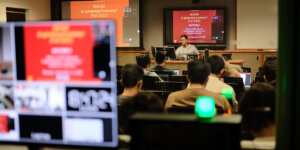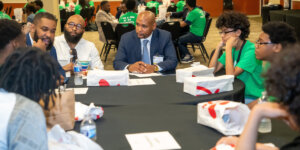
Jovani Esparza is a current freshman majoring in mechanical engineering at USC.
When Jovani Esparza was 10 years old, he was already working 10-hour shifts transporting gravel in the passenger seat of his father’s truck. As an elementary schooler, he could already change oil and help fix and maintain trucks. Over the next eight years, he worked everywhere from a bakery to Walgreens, all while maintaining excellent grades and playing sports.
A Dean’s Scholarship recipient and a new freshman at the USC Viterbi School of Engineering majoring in mechanical engineering, Esparza is a first-generation college student who plans to use his strong work ethic and independence to take advantage of the opportunities at Troy.
“My parents have always pushed me to strive for the best,” he said. “Their story and their work ethic inspire me, and I hope I can make them proud.”
Esparza grew up in Crowley, Texas, a suburb outside of Dallas. Balancing work with excellent grades required Esparza to endure late nights and to study and do homework whenever he could during his shifts.
“Helping provide for my family at such a young age was difficult because I missed out on a lot of my childhood,” Esparza said. “But I always wanted to be able to work to help support my role in the family. I knew we wouldn’t be able to afford SAT books or tutors, so I wanted to be able to help provide those myself.”
Esparza’s pursuit of higher education follows in the footsteps of his brother, Carlos Esparza, who graduated from the University of Texas at Arlington in 2013 with a degree in civil engineering. “My brother was a huge role model for me. If it wasn’t for him, I don’t think I’d be at USC right now,” he said. “Watching him go to college and study engineering was what made me so determined to follow in his path.”
In high school, Esparza played baseball all four years and was also a part of the powerlifting team. Inspired by a love of sports and the outdoors instilled in him by his older brother, Esparza has already joined the USC intramural frisbee team, as well as SC Outfitters, a student-run club that organizes hikes, camping trips, and other adventurous outdoor activities and trips throughout the Southwest.
“Being outdoors is something I’m really passionate about, so the weather in LA was something that definitely drew me to USC,” Esparza said. “Besides that, it was the environment and culture here, which I found to be very supportive and uplifting, especially compared to a lot of the other universities I was considering.”
Esparza’s parents, Jesus and Rosa Esparza, come from a small village in Mexico. Neither advanced beyond the fourth grade, Esparza said. They both came to the U.S. as teenagers to look for work.
“They came to America to provide a better opportunity for my siblings and me,” he said. “I always wanted to make them proud and take advantage of any opportunity that I could.”
Jesus Esparza would leave for work at 3 a.m. and would not arrive home until 8 p.m. He drove trucks to deliver gravel to construction companies, while his wife, Rosa, watched the neighbor’s children, as well as cooked, cleaned and cared for her own three kids. “My parents are the most hard-working people I know,” Esparza said.
“Even though it was hard to balance constantly working with school and sports, it made me independent and dedicated to continue my own education,” Esparza added. When things got tough, it was his family that kept him going.
When Esparza thinks about what he hopes to do in the future, he thinks first of where his parents came from.
“My parents grew up in a village that had less than a thousand people and very poor water systems,” he said. “To get clean water, they would have to walk to nearby rivers.”
His dream: use his degree to work in engineering infrastructure to bring clean water to people in countries that lack access to it.
Published on January 16th, 2020
Last updated on January 16th, 2020












